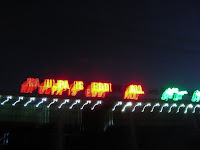January marked my first trip to Kabul, one of many in my future. I've started working with a new company which owns a joint venture collecting survey data across Afghanistan. As part of my role I am involved in refining the operation while helping managing the ever-growing client base.

My first trip was marked by world class air accommodations. While I had at first intended to fly a domestic airline to accrue
preferred customer status, my colleague talked me into flying Emirates Airlines through Dubai. A cannot begin to express the difference. I'm not sure I'll ever fly domestic to the Middle East again.
www.emirates.com
Flying business class only added to the experience. Beginning with the fine wines and Middle Eastern buffet in the top flight private lounge at JFK to the free
chauffeured cars to the hotel in Dubai, the experience was second to none. The cocooned seats, simulated starry skies on the airplane roof, Internet connectivity on the plane and 150 channels of on demand movies, radio and games on a 14" screen in the seat added to the experience. At 33,000 miles a round trip, I'll be a gold status customer on my second go. Free upgrades here I come!

It is well earned luxury, for the leg from Dubai to Kabul is inglorious. We generally fly Ariana Afghan Airlines, primarily because the scheduling works out well. We also joke it is less likely to draw Taliban attention being
indiscriminately packed full of Afghans from various places. Of course, this also means I am packed in with them. This trip appeared to be a plane full of a group of pilgrims returning from the
Hajj. My colleague and I noted in the terminal the number of these pilgrims clothed in their uniform
ihram who were ill and coughing. We survived the plane trip and the airport in Kabul, where we stood packed in the processing chute for immigration with these folks.

Kabul is not especially cold in January. At 6,000 ft. elevation nestled in the wintry mountains of the Hindu
Kush, it reminds me of Utah winters. But there is no heat. The airport is a bare, concrete ice box. I felt sorry for the pilgrims standing in line in their two piece
ihram, that is until we got to baggage claim. At that point it became a free-for-all under the dim light of a few bulbs hanging by wires from the unfinished roof. It was polite. It was not pleasant. I marveled at how the pilgrims could sort out which 5 gallon container of holy water belonged to whom as dozens without markings, but with identical orange caps, rolled out of the baggage door in a row. Perhaps it didn't matter.....
During a previous trip to Haiti I began to keep a list of things which are common to developing, post-conflict, or just plain forgotten parts of the world. European,
Caribbean, Asian; I have come to find that it makes no difference, as the requirements of living encourage their existence. Kabul is no different. Items on this list include;
- wild dogs wandering the streets, sometimes in packs
- mostly muddy, unpaved or broken roads
- second hand cars of all kinds and conditions imported for resale
- public transport as single vehicle enterprise
- buildings made of preformed concrete slabs or unfinished masonry
- rusty steel where concrete won't do
- retail sales as cottage industry, mostly street vendors or kiosks
- people sitting or walking about without much else to do, generally watching those that do
- few or no utilities; water, electricity or gas. Thus no heat, light or working toilets.
- landscapes stripped of anything consumable
- packs of children or older women begging for handouts from foreigners
- wooden carts with used tires for wheels drawn by beasts of burden (or people)

As you can imagine, "living" in such places takes on a whole new meaning. One of the novelties of my Kabul experience was having an office full of computer equipment, but heated by wood-burning stoves made from converted 55 gallon diesel drums. We run an entire two story office off our own generator, but continue to heat it with wood shipped in from the countryside. This is primarily due to the poor electrical wiring in the building which limits the load we can pump through it. The hotel we stayed at was somewhat better, with the dining and guest rooms heated by portable electric heaters, though passing through the hallways from one to the other caused my breath to steam.
But the hardships are all worth it because of the people. I am fascinated by people's values, beliefs and behaviors, which is a good thing as I get paid to observe and measure them. Kabul was full of interesting experiences.
The employees in our office are a cross-section of Afghanistan. Divided into the two primary language groups of
Pashto and Dari, many of them have to work at communicating with each other. English is rare and not well spoken. Russian is slightly better. German is unheard of. As with all my other experiences working outside native English-speaking countries, the result is people speaking whatever language accomplishes the goal best, regardless of whether it is native. Abdul our accountant speaks halting German and worse English, so I found myself using German with him. My colleague speaks fluent Russian, which a number of the
Kabuli staff speak, so there was some of that flying around at times. And depending on which field team staff you were talking to, you would need a Dari or
Pashto translator respectively. The pace of company staff meetings is often painfully slow due to language issues.

Our office employs several women. Women in urban Afghanistan are beginning to reclaim the freedoms which had been brought by the Soviets. We hired two younger ladies during my visit who were university educated, but wore headscarves and were uncomfortable making eye contact with men. This is the custom in Afghanistan. We discussed with them what they did growing up under the Taliban and they indicated they had mostly been locked up at home. Conversely, our operations manager is an older lady who has no such customary behaviors and wears a suit.
There are other customs which I learned about on this trip through work on one of our projects novel enough to mention here. They have apparently persisted for a long time and are traditional sentences handed down by tribal elder councils, or
Jirgas. They include the burning of an offender's house, blood money, collective social boycott, and giving a women from the offender's household to that of the victim.
More pleasantly, I also enjoyed the custom of sitting on carpet-strewn floors to interview a new supervisor for one of our field operations. In Afghanistan it is obligatory to treat a visitor as an honored guest. It is also customary to sit in a circle or with backs to the walls of a room with the honored person across from the door. So imagine an interview of one person in a room, on the floor, in a circle of 10 people, where interviewer and interviewee are 15 feet apart, conducted in three or more languages (Russian, Dari and
Pashto). That the applicant was dressed in traditional garb with turban just added to the novelty.

Meals were also taken on the floor. As is custom in Kabul, the office provided lunch as part of its benefits. Here I am eating with my colleague and our German speaking accountant. Rice, beans, flat-bread and kebab yet again! Can't complain, really, I like it, especially the rice with raisins and saffron.
So much for this posting. My next installment will probably be from Cairo in March. Looking forward to it!





















































